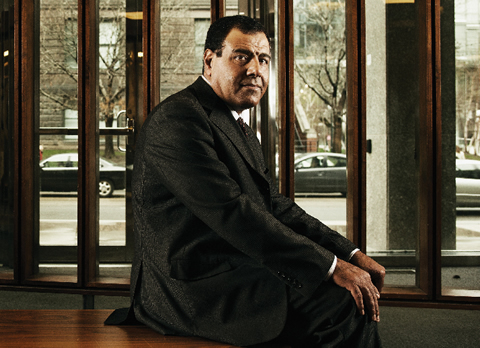Dr. Izzeldin Abuelaish, a professor in global health at the Dalla Lana School of Public Health, is standing in front of a large framed photo in his office. The picture is of three girls wearing pretty, delicate headscarves, on a beach with the clear blue Mediterranean behind them. In the sand, each has written her name: Mayar, Aya and Bessan. The girls are three of Abuelaish’s daughters, who were killed a month after the picture was taken – on January 16, 2009, during the Israeli incursion into the Gaza Strip. “They were very successful, very brilliant, very bright girls,” says Abuelaish, who lived in Gaza and worked in a hospital in Tel Aviv, Israel, at the time. “Bessan was supposed to finish her BA, six months after she was killed. Mayar was the brightest girl in Gaza Strip in math – the teachers were fighting to get her in their classes…. Aya, the beautiful, was the girl who dreamed.”
The picture is also on the cover of Abuelaish’s new book, I Shall Not Hate: A Gaza Doctor’s Journey, which recounts his life story – and the tragedy that happened during the Israeli assault on Gaza: Abuelaish – who had eight children – had just walked out of the girls’ bedroom when the first shell hit, killing his three daughters and niece Noor. His daughter, Shatha, and another niece were severely wounded. (His wife, Nadia, had died of leukemia four months earlier.) The immediate aftermath was captured on live TV, when Abuelaish phoned a journalist friend for help. Two days later the Israeli prime minister announced a ceasefire, which Abuelaish believes was instigated after the leader saw him on TV. “I told my daughter, Shatha… the blood of your sisters wasn’t in vain. It saved others’ lives.”
As a doctor, Abuelaish has always tried to foster dialogue and build a bridge between Palestinians and Israelis. For years, he lived in Gaza Strip and worked in hospitals in Israel. (He was one of the very few Palestinians who had a permit to work in the country.) Abuelaish sees hospitals as a place where people can be seen for their humanity – where doctors treat patients, not nationality or ethnicity. In his book he sends a message of tolerance that encourages not only Israelis and Palestinians, but people throughout the world to see the humanity in each other and promote a brighter future for their children.
In honour of his daughters, Abuelaish has started the Daughters for Life Foundation, which will provide education and health-care access to girls and women in the Middle East. He believes a shift toward peace lies partly in helping females reach their full potential. (Indeed, in his book, he writes that “It’s easy to find a thousand men in favour of war; it’s difficult to find five women who are inclined that way.”)
“I want to tell others that life doesn’t stop with tragedies. My daughters’ names were written in sand, and now they are written on tomb[stones]. But they will be returned in stone, in metal, by actions, by deeds,” says Abuelaish, referring to their names being written on buildings that support the edu- cation of girls. His voice catches and tears well in his eyes. “In my life that is all I want: to give justice to those girls, and other innocent people in this world.”
Recent Posts
U of T’s Feminist Sports Club Is Here to Bend the Rules
The group invites non-athletes to try their hand at games like dodgeball and basketball in a fun – and distinctly supportive – atmosphere
From Mental Health Studies to Michelin Guide
U of T Scarborough alum Ambica Jain’s unexpected path to restaurant success
A Blueprint for Global Prosperity
Researchers across U of T are banding together to help the United Nations meet its 17 sustainable development goals






